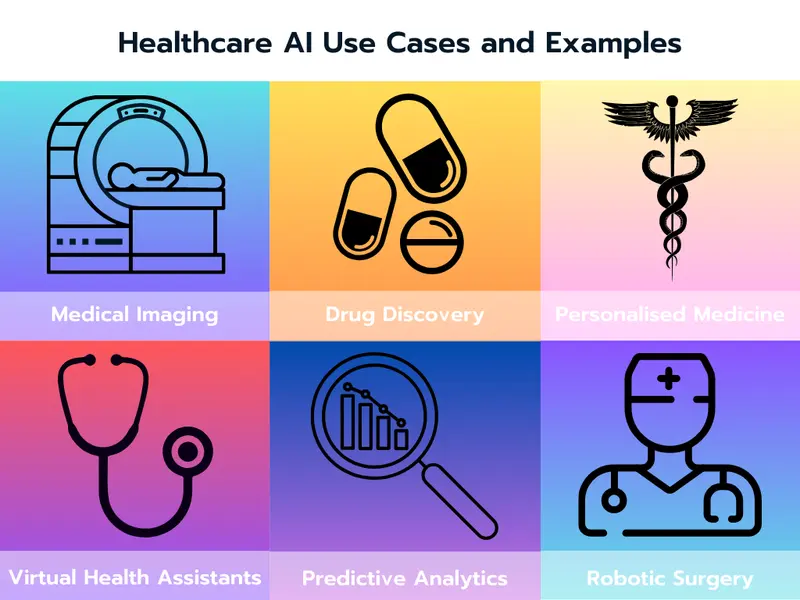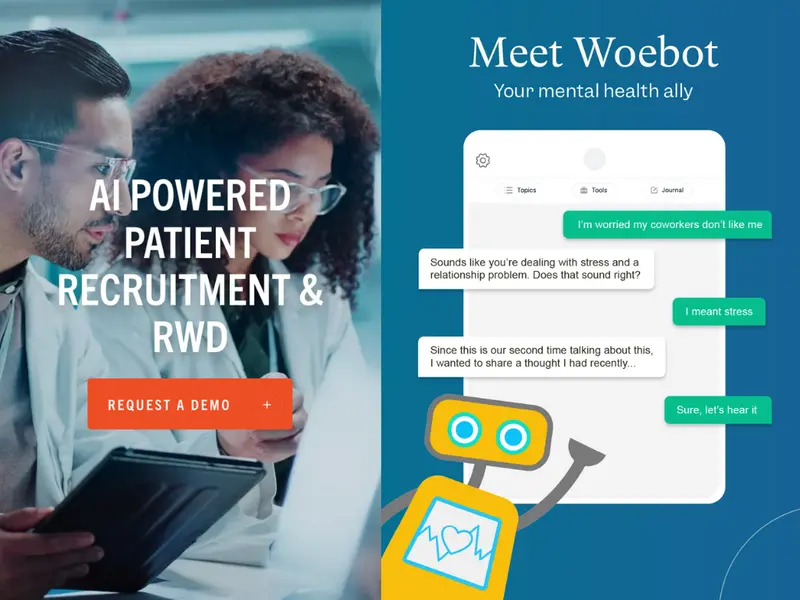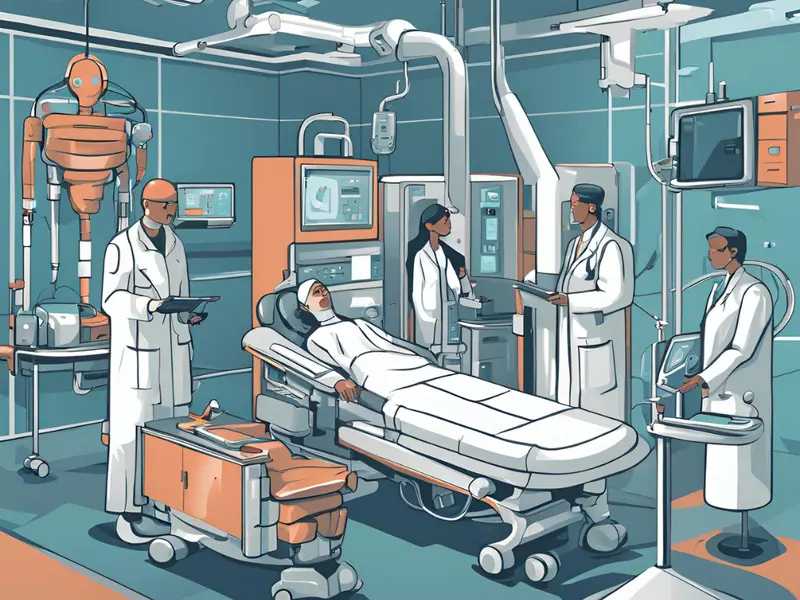This article will cover how AI is used in healthcare and its current challenges today. From diagnosing diseases to managing hospital workflows, AI is reshaping how medical professionals and institutions operate. Read on to learn more.
Key Takeaways
- AI in healthcare has multiple applications such as medical imaging, drug discovery, virtual health assistant, among many more!
- Today, Deep 6 AI, Woetbot, and Nuance Communications are examples of platforms and apps leveraging AI to assist patients.
- The biggest challenge of using AI in healthcare is data privacy and security.
- Using AI in healthcare has multiple advantages such as enhanced patient experience and faster decision-making, but also has disadvantages such as lack of transparency of AI models and biased diagnosis.
- In the future, we should expect more predictive medicine with AI for early intervention.
Healthcare AI Use Cases and Examples

AI in healthcare spans a wide range of applications. Here are some examples:
- Medical Imaging: AI-powered tools can detect abnormalities like tumours or fractures in X-rays and MRIs faster than radiologists.
- Drug Discovery: Algorithms predict how potential drugs interact with biological systems, speeding up research.
- Personalised Medicine: AI analyses genetic data to recommend individualised treatments.
- Virtual Health Assistants: Chatbots and voice assistants help patients book appointments, track medications, and manage chronic conditions. It also helps training pharmacists and doctors on new treatments and medications.
- Predictive Analytics: AI identifies high-risk patients to prevent hospital readmissions or complications.
- Robotic Surgery: AI-assisted robots perform surgeries with precision, reducing recovery times.
What Are Some Good and Bad Uses of AI in Healthcare?
Let's look at some good and bad uses examples of using AI technology in Healthcare:
| Category | Examples |
|---|---|
| Good Uses |
|
| Bad Uses |
|
Yes, using AI for health-related purposes can help doctors assist patients in a more efficient and faster way, but there are still rules and regulations that should be implemented to prevent the misuse of this technology in such an important industry.
Benefits of AI in Healthcare
What are the advantages then of using AI in Healthcare? We looked at positive and negative healthcare AI uses, now let's have a look at why it helps:
- Increased Accuracy: AI excels at identifying patterns in medical data, leading to more accurate diagnoses.
- Faster Decision-Making: Doctors get real-time insights to make faster and more informed decisions.
- Cost Savings: Automation reduces administrative and operational expenses.
- Enhanced Patient Experience: AI enables personalised care, improving satisfaction.
Cons of AI in Healthcare
Why shouldn't we use artificial intelligence in healthcare? Now let's look at the disadvantages of using AI in healthcare:
- High Maintenance Costs: Developing and maintaining AI systems can be expensive.
- Data Privacy: AI systems require vast amounts of patient data, raising concerns about confidentiality.
- Job Displacement: Automation may replace some roles in healthcare, leading to workforce challenges.
- Lack of Transparency: AI models often function as “black boxes,” making it hard to understand their decision-making process.
How is AI Used in Healthcare Today?

Today, AI is deeply integrated into healthcare systems worldwide. For example:
- Clinical Trials: Deep 6 AI uses AI to match patients to clinical trials in real-time, significantly accelerating the recruitment process.
- Mental Health Support: Woebot is an AI-driven app that provides CBT-based therapy and mental health monitoring.
- Electronic Health Records (EHR): Nuance Communications developed a Natural Language Processing (NLP) tool to extract relevant data from medical records for easier access.
- Telemedicine Platforms: Babylon Health used AI to assist patients in assessing symptoms and determining the urgency of medical care, enhancing virtual consultations with symptom-checking tools.
And these are just some examples of how companies use and develop AI tools to revolutionise healthcare - improving efficiency, patient outcomes, and accessibility worldwide.
However, it's not all roses, Babylon Health failed for underdelivering and overpromising AI's capabilities in healthcare, failing to provide accurately diagnosing complex medical conditions among other issues. AI in healthcare still has its advantages and disadvantages as we discussed above, there are still challenges that need to be addressed before normalising the use of this technology in healthcare.
What is The Biggest Concern About The Use of AI in Healthcare?
The biggest concern about the use of AI in Healthcare is data privacy and security. With healthcare systems relying on large datasets, any breach could expose sensitive patient information, leading to mistrust and legal complications. Furthermore, ensuring that AI decisions are unbiased and transparent remains a challenge.
Top AI Healthcare Companies
Who uses or develops healthcare AI applications today? Here is a list of healthcare companies using AI:
- IBM Watson Health: Known for its advanced AI solutions in medical imaging and drug discovery.
- Google Health: Focuses on applying AI to improve patient care and diagnostics.
- Tempus: Specialises in precision medicine and genomic data analysis.
- PathAI: Develops AI-powered tools for pathology analysis.
- Butterfly Network: Uses AI in handheld ultrasound devices.
What is The Future of AI in Healthcare?

It is still too early to rely solely on AI to provide full diagnoses and treat patients. However, the future of AI in healthcare looks incredibly promising. One significant area of growth is predictive medicine, where AI will analyse genetic, lifestyle, and environmental data to focus on prevention and early intervention.
Additionally, AI has the potential to improve global accessibility by bridging gaps in underdeveloped regions, offering affordable and scalable diagnostic tools that can reach underserved populations.
Furthermore, enhanced collaboration and data sharing is to be expected between healthcare providers, researchers, and patients, fostering more efficient and personalised care.
FAQs
References
- The Role of AI in Healthcare - Forbes
- Ethical Considerations in AI-Powered Healthcare - World Health Organisation.

